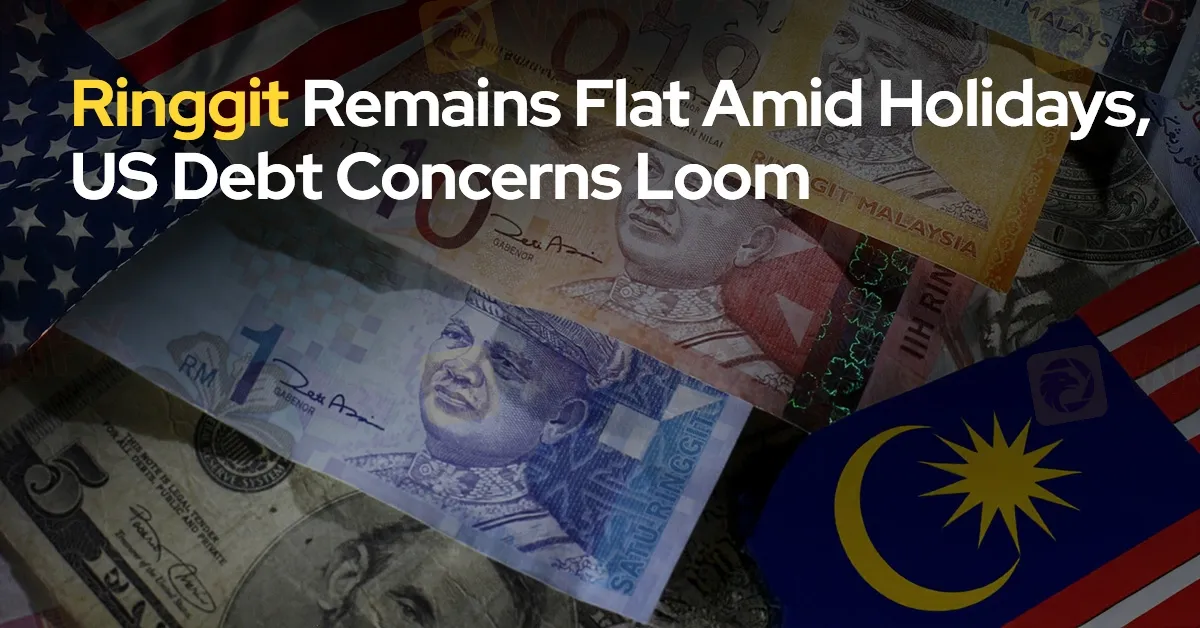简体中文
繁體中文
English
Pусский
日本語
ภาษาไทย
Tiếng Việt
Bahasa Indonesia
Español
हिन्दी
Filippiiniläinen
Français
Deutsch
Português
Türkçe
한국어
العربية
Ringgit Remains Flat Amid Holidays, US Debt Concerns Loom
Abstract:The Malaysian ringgit began the week steady against the US dollar, showing little movement due to a lack of market catalysts during the holiday-shortened trading week.

The Malaysian ringgit began the week steady against the US dollar, showing little movement due to a lack of market catalysts during the holiday-shortened trading week. The currency opened at 4.4680/4750 against the greenback at 8 am, mirroring its close from last Friday.
Market sentiment remains subdued, with attention focused on developments in the United States economy. Dr Mohd Afzanizam Abdul Rashid, Chief Economist at Bank Muamalat Malaysia Bhd, explained that the ongoing holiday period is keeping activity in the currency markets muted. He noted that concerns surrounding the US debt ceiling are dominating investor focus.
The economist highlighted a warning from the US Treasury Secretary that the government could reach its borrowing limit by mid-January. Recent political uncertainty over a potential government shutdown, combined with hawkish rhetoric from President Donald Trump and prominent businessman Elon Musk, has added to the unease. Dr Afzanizam observed that these issues might create challenges as the new US president prepares for inauguration on 20 January.
With these developments in mind, the ringgit is expected to trade within a narrow range, reflecting the cautious sentiment in the market.

The ringgit faced a mixed performance against other key global currencies. While it gained slightly against the Japanese yen, rising to 2.8296/8343 from 2.8300/8346 last Friday, it weakened against the British pound, sliding to 5.6199/6287 from 5.5904/5991. Similarly, it declined against the euro, ending at 4.6601/6674 compared to 4.6489/6574 previously.
The local note also showed varied performance within the ASEAN currency bloc. It weakened against the Singapore dollar, slipping to 3.2899/2955 from 3.2846/2900, and fell against the Thai baht, trading at 13.1196/1583 from 13.1023/1289.
However, the ringgit strengthened marginally against the Indonesian rupiah, improving to 275.1/275.7 from 275.4/276.1. Its position remained unchanged against the Philippine peso, holding steady at 7.72/7.74.

Disclaimer:
The views in this article only represent the author's personal views, and do not constitute investment advice on this platform. This platform does not guarantee the accuracy, completeness and timeliness of the information in the article, and will not be liable for any loss caused by the use of or reliance on the information in the article.
Read more

WikiFX Gala Night Malaysia Concludes Successfully
On June 27, 2025, WikiFX Gala Night Malaysia came to a successful close. The event focused on FinTech trends in Southeast Asia and the development of a compliant forex ecosystem, bringing together premium brokers, industry KOLs, payment technology providers, and local IB representatives from Malaysia, Singapore, Indonesia, the Philippines, and beyond to delve into forex opportunities in the new phase.

The Dollar Keeps Falling: How Should We View Exchange Rate Volatility?
The U.S. dollar continues to weaken, triggering ripple effects across global markets. Beneath the currency’s depreciation lies a deeper crisis in its credibility, institutional foundation, and global financial status.

Are Trading Courses and Mentors a Fast Track or a Financial Trap?
In recent years, trading has become more popular than ever. Social media is full of people showing off their “trading lifestyle” with expensive cars, luxury holidays, and promises of easy money. Many of them claim to be mentors, investment coaches, or run online trading academies. They say they can turn beginners into full-time traders in just a few weeks. But is it true, or is it just a clever scam?

Gold Prices Pull Back, Near Four-Week Low Amid Easing Risk Sentiment
As risk aversion fades and investors turn their attention to U.S. inflation data, gold prices retreat sharply, falling to their lowest levels in nearly a month.
WikiFX Broker
Latest News
Stablecoins go mainstream: Why banks and credit card firms are issuing their own crypto tokens
The Dollar Keeps Falling: How Should We View Exchange Rate Volatility?
Asia-Pacific markets rise as investors parse a slew of data releases
Asia-Pacific markets mostly rise as investors parse a slew of data releases
WikiFX Gala Night Malaysia Concludes Successfully
IG Group Unlocks Over £425 Million amid a Capital Reduction
Are Trading Courses and Mentors a Fast Track or a Financial Trap?
At 20 years old, Reddit is defending its data and fighting AI with AI
Debt is a growing force' influencing jobseekers' choices, career expert says. Here's how
Gas prices are expected to fall: It's going to be the cheapest summer since 2021,' one expert says
Currency Calculator


